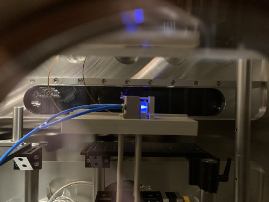Supervisors: Gudrig Moortgat-Pick (University of Hamburg) & Kristjan Põder (DESY)
Universität Hamburg —University of Excellence— is one of the strongest research educational institutions in Germany. Our work in research, teaching, educational and knowledge exchange activities is fostering the next generation of responsible global citizens ready to tackle the global challenges facing us. Our guiding principle “Innovating and Cooperating for a Sustainable Future in a digital age” drives collaboration with academic and non-academic partner intitutions in the Hamburg Metropolitan Region and around the world. DESY, with more than 2900 employees at its two locations in Hamburg and Zeuthen, is one of the world's leading accelerator centres and it research focuses on revealing the tiniest building blocks of forces and matter, substantial for exploring the qubits of the Universe.
Plasma based compact accelerators are extremely attractive due to their ultrahigh acceleration gradients. A key requirement of electron beams are stable and high spin-polarisation. Spin-polarised beams are substantial for many aspects of fundamental research. Broad access to compact polarised electron sources would potentially allow enormous leaps in science. However, it is still unclear how a polarised beam behaves in a plasma accelerator. Therefore the focus of the project will be to study the physics of spin depolarisation in plasma accelerators and to understand the effect of beam parameters on final polarisation. Concepts for the experimental realisation of a spin-polarised plasma accelerator will be developed. This project is at the interface between RF and plasma-based accelerators and will be closely accompanied by an interdisciplinary supervision and mentoring team.
Given a pre-polarised electron source, these spin-aligned electrons must be injected into the plasma accelerator without misaligning the spins to be further accelerated to result in a highly-polarised high-energie electron beam. This project will focus on the development of a pre-polarised plasma source and to characterise the degree of polarisation during plasma acceleration and/or plasma lensing. After a simulation-based optimisation of the injection process, concepts for upgrading a plasma source of an existing plasma accelerator to a polarised one and for measuring for the first time a polarised electron beam under plasma acceleration will be developed.
Expected Results
- Conceptual design for testing polarised sources and spin preservation in plasma accelerators
- Provide the basis for spin-polarised beam generations
- Journal publications and presentations on International conferences
Planned secondments
- 2 months at University of Bonn (year 1): get familiar spin-beam dynamics in RF accelerators
- 2 months at FORTH (end of year 2): experience with pre-polarised plasma sources for plasma accelerators
Apply for this research project here

